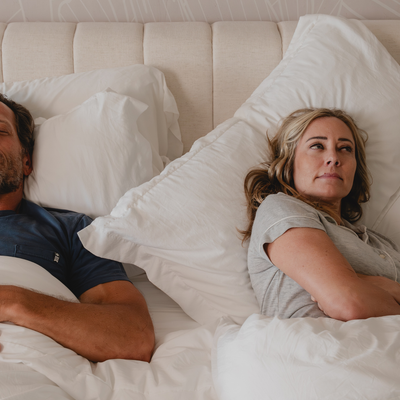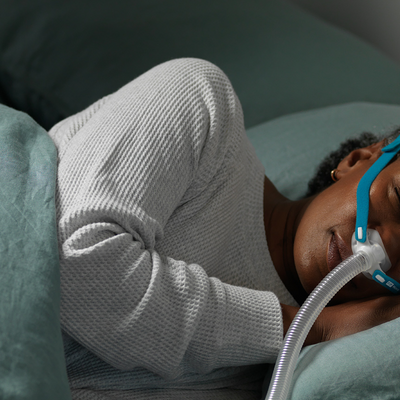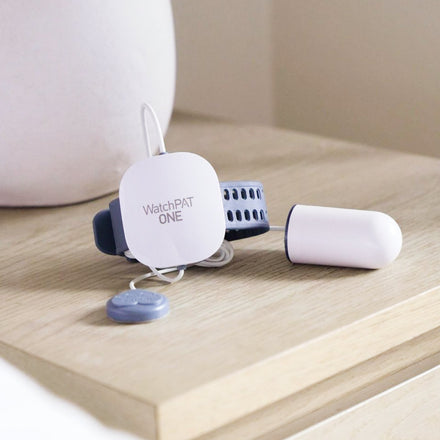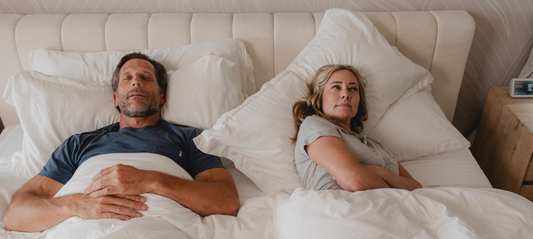If your daily life or health are declining due to a lack of restorative sleep, you might be wondering if you have a common sleep disorder such as sleep apnea or insomnia.
While you’ve probably heard of both, knowing the difference is the first step to finding the most relevant treatments and support.
What’s the difference between sleep apnea and insomnia?
The main difference between sleep apnea and insomnia is what is causing your sleep disturbance. Sleep apnea occurs when your breathing is paused or interrupted during sleep because of a repeated cessation or reduction of airflow, causing you to wake up multiple times per night to regain your breath. Due to the nature of sleep apnea, you might be unaware or have no memory of these episodes.
There Are Two Types of Sleep Apnea
The first and most common is Obstructive Sleep Apnea (OSA), which causes disrupted breathing due to a blocked or narrow passageway. OSA affects 10-20% of middle to older age adults. A less common form of sleep apnea, Central Sleep Apnea (CSA) causes sleep interruption because of a dysfunction in the central nervous system.
While both types of sleep apnea share symptoms, the treatments are very different. For example, if you have OSA, wearing a CPAP machine at night can help to keep your airways open while you sleep, alleviating the constant sleep interruptions due to disrupted breathing. A home sleep test can help you find out if your sleeplessness is the result of sleep apnea.
Insomnia
Insomnia, on the other hand, can have a variety of causes. While it’s common to have a night or two of sleeplessness, insomnia occurs over a longer period of time. According to Mayo Clinic, acute insomnia, sleeplessness for a few days or weeks, is usually caused by an outside stressor or traumatic event. Chronic insomnia, sleep disturbances lasting a month or more, can be caused by age, mental illness, diet, poor sleep habits, or certain medications.
Symptoms of insomnia include difficulty falling asleep, waking up multiple times during the night, early morning wake ups, not feeling well-rested, or a complete inability to fall asleep at all.
What do sleep apnea and insomnia have in common?
Obviously, both sleep apnea and insomnia disrupt the quality of your rest. A lack of restorative sleep can affect your life and health in dramatic ways. The daytime symptoms from both sleep apnea and insomnia include symptoms such as:
- Fatigue
- Difficulty concentrating
- Moodiness
- Irritability
- Increased risk of accidents
- Daytime sleepiness
Sleep apnea and insomnia also have a negative effect on your health, putting you at risk for heart disease and diabetes.
Does sleep apnea cause insomnia?
Insomnia is considered one of the possible symptoms of sleep apnea. OSA is considered a precursor to or risk factor for insomnia. If you have OSA and receive the appropriate treatment, such as with a CPAP machine, you may experience a reduction of your insomnia symptoms.
For example, a study by Caetano Mota and colleagues found that 45.8% of patients who reported insomnia symptoms and were also diagnosed with OSA no longer experienced insomnia after CPAP treatment. However, those who didn’t have a sleep apnea diagnosis actually developed insomnia symptoms with the use of CPAP treatment.
If after treating your OSA, you still experience insomnia symptoms, you might benefit from a combination of treatments. Common treatments for insomnia include medication and Cognitive Behavioral Therapy (CBT). One study found that CBT in addition to the use of a CPAP machine helped improve the sleep of 15 out of 17 of patients who reported both an OSA diagnosis and insomnia.
To get relief from any lack of restorative sleep that you’re currently experiencing, you should consult with a doctor or take an in-home sleep assessment to get an accurate diagnosis and be on your way to better rest.











































